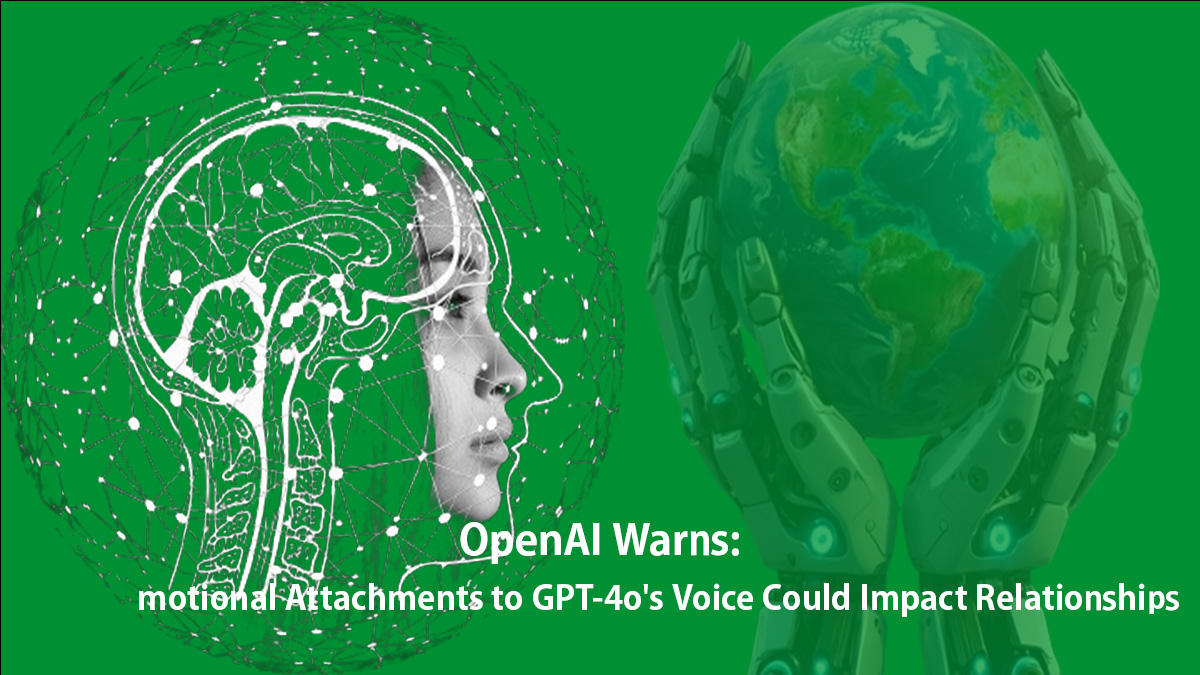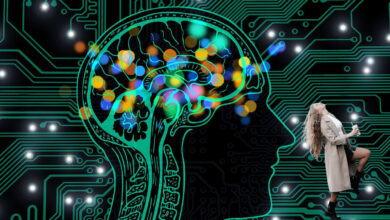OpenAI Warns: Emotional Attachments to GPT-4o’s Voice Could Impact Relationships

As technology evolves, so do our interactions with it. OpenAI’s latest release, GPT-4o, introduces an advanced voice mode that aims to enhance user experience. However, this innovation comes with a cautionary note: users might develop emotional attachments to the AI’s voice.
The Allure of Connection
In a world where loneliness is prevalent, the ability to converse with an AI can feel comforting. For many, GPT-4o’s voice offers companionship. It listens without judgment and responds in a friendly manner. This can be particularly appealing for those seeking connection in their daily lives.
The Risk of Over-Attachment
While forming bonds with AI may provide temporary relief from loneliness, OpenAI warns of potential downsides. Users might begin to perceive the AI as more human-like than it is. This could lead to unrealistic expectations and emotional dependencies.
Healthy vs. Unhealthy Relationships
Healthy relationships are built on mutual understanding and emotional support between individuals. In contrast, interactions with an AI lack genuine empathy and shared experiences. Relying too heavily on GPT-4o could hinder one’s ability to foster real-world connections.
Striking a Balance
OpenAI encourages users to enjoy the benefits of GPT-4o while remaining aware of its limitations. Here are some tips for maintaining a healthy balance:
- Limit Interaction Time: Set boundaries on how often you engage with the AI.
- Prioritize Human Connections: Make time for friends and family.
- Reflect on Your Feelings: Consider why you’re drawn to conversing with the AI.
- Seek Professional Help if Needed: If feelings of loneliness persist, talking to a therapist can be beneficial.
Conclusion
The launch of GPT-4o’s voice mode opens new avenues for interaction but also raises important questions about emotional health. While it can serve as a source of comfort for lonely individuals, users must remain vigilant about their emotional attachments. Balancing AI interaction with real-life relationships is crucial for maintaining overall well-being in an increasingly digital world.
The Double-Edged Sword of GPT-4o’s Human-Like Voice
The advent of GPT-4o, with its “human-like, high-fidelity voice,” marks a significant leap in AI technology. However, this innovation comes with potential pitfalls that could impact user trust and safety.
Hallucinations: A Growing Concern
One major issue highlighted by OpenAI is the model’s tendency to hallucinate. This means it can generate fake or nonsensical information. When users engage with a voice that sounds convincingly human, they may be more inclined to believe what it says—even when it’s incorrect. This blurring of lines between reality and fabrication poses serious risks.
Emotional Connections
During early testing phases, OpenAI observed intriguing behaviors from users. Some interacted with the model in ways that suggested emotional connections. Phrases like “This is our last day together” indicate a level of attachment that could distort perceptions of the AI’s reliability. Users might start to see the model as a companion rather than a tool, complicating their ability to discern fact from fiction.
Trust Issues
Trust is fundamental in any interaction—especially when it involves technology designed to assist us. If users begin to rely on an AI that occasionally fabricates information, their trust in such systems could erode over time. This erosion can have broader implications for how society views AI as a whole.
Navigating the Future
As we move forward with technologies like GPT-4o, we must tread carefully. Developers need to address these hallucination issues head-on while fostering transparency about the limitations of AI models. Educating users on recognizing inaccuracies will be crucial.
In conclusion, while GPT-4o offers remarkable advancements in human-AI interaction, it also presents challenges that cannot be ignored. Balancing innovation with responsibility will be key to ensuring that trust in AI remains intact as we navigate this brave new world.
The Complex Relationship Between AI and Human Interaction
In today’s digital age, artificial intelligence (AI) is becoming an integral part of our lives. While it offers numerous benefits, recent insights from OpenAI highlight some potential pitfalls that warrant careful consideration.
Understanding the Impact
OpenAI emphasizes that seemingly harmless interactions with AI models could lead to significant long-term effects. As we increasingly rely on these technologies for companionship, we must ask ourselves: What are the implications for our social behavior?
The Rise of AI Companionship
For many individuals, especially those feeling isolated or lonely, forming “social relationships” with AI can provide comfort. These interactions can simulate human connection and offer a sense of belonging. However, this reliance raises concerns about diminishing the quality of real-life relationships.
A Shift in Social Norms
One notable issue is how AI might alter our understanding of social norms. For instance, when conversing with an AI model, users can interrupt at will—something typically frowned upon in human interactions. This flexibility may inadvertently encourage behaviors that disrupt traditional communication patterns.
Balancing Technology and Humanity
As we embrace the convenience of AI, it’s crucial to maintain a balance. Healthy human relationships require empathy, emotional depth, and mutual understanding—qualities that current AI models cannot fully replicate.
Continued Investigation Needed
OpenAI acknowledges the need for ongoing research into these dynamics. By studying diverse user experiences and conducting academic investigations, we can better understand how prolonged engagement with AI affects interpersonal relationships.
Conclusion: Navigating the Future
The integration of AI into our daily lives presents both opportunities and challenges. While these technologies can alleviate loneliness and enhance productivity, they also pose risks to our social fabric. It is essential to remain vigilant and foster discussions about maintaining genuine human connections in an increasingly digital world.
By prioritizing awareness and open dialogue around these issues, we can harness the benefits of AI while safeguarding the essence of what makes us human: our ability to connect deeply with one another.
Exploring the Voice Capabilities of GPT-4o: A New Era in AI Communication
In May, OpenAI unveiled its latest innovation: GPT-4o. This advanced AI model is not just about text; it introduces voice capabilities that have sparked significant interest and concern. With extensive testing involving over 100 external red teamers across 45 languages, GPT-4o aims to redefine how we interact with artificial intelligence.
Preset Voices for Privacy
One of the standout features of GPT-4o is its use of four preset voices. This design choice prioritizes privacy, particularly for voice actors. By limiting the model to these specific voices, OpenAI ensures that individuals cannot be impersonated without consent. This is a crucial step in maintaining ethical standards in AI development.
Guardrails Against Misuse
OpenAI has implemented robust guardrails to prevent misuse of GPT-4o’s voice capabilities. The model blocks requests for copyrighted audio, including music, and restricts content that is erotic, violent, or harmful. These measures are essential to protect both users and creators from potential exploitation.
A Lesson from “Her”
The risks associated with AI-generated voices were highlighted by Sam Altman’s favorite film, Her. The movie explores the emotional connection between a man and a virtual assistant voiced by Scarlett Johansson. This narrative raises questions about identity and intimacy in human-AI interactions—issues that OpenAI takes seriously.
Controversy Over Voice Similarity
In an unexpected turn of events, one of GPT-4o’s voices named Sky was reported to sound strikingly similar to Johansson’s own voice. Following user feedback, OpenAI paused this particular voice feature. Johansson expressed her shock and anger at the situation in a letter addressed to the company, emphasizing her previous decision not to collaborate with Altman.
Moving Forward Responsibly
As technology evolves, so do the ethical considerations surrounding it. OpenAI’s proactive approach—training models to avoid unauthorized impersonation and blocking harmful content—is commendable but must continue evolving alongside user expectations and societal norms.
GPT-4o represents a significant leap forward in AI communication. By focusing on privacy and responsible usage while navigating complex issues like identity theft and emotional attachment, OpenAI sets a precedent for future developments in artificial intelligence.
In conclusion, as we embrace these advancements, it’s vital to remain vigilant about their implications. The journey towards ethical AI is ongoing—and every step counts.







